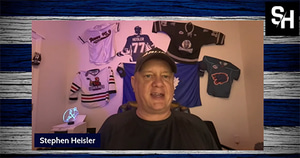JuniorHockey.io
THE VAULT: BEST PRO MARKETS TO FLIP TO BECOME NEW JUNIOR LEAGUE Expansion. Just the utterance of the word gives junior hockey purist the shakes.
Nov 6, 2024
Play: AI Text To Voice
“Stop it already, the level of play is watered down as it is,” is the most common comment. I’m often referred to as one of the old school hockey guys. So, I get the concern.
So, let's be realistic, free-to-play junior hockey is a more viable business model than most low level minor professional hockey teams. With the National Hockey League’s continued push for more control over player development, there’s minimal opportunity for players from the Southern Pro Hockey League and Federal Prospects Hockey League to successfully climb the ladder of development to the big show.
Let’s step outside of the box and call our new league the Southern Prospects Hockey League.
Coaches – With the elimination of player payroll and workers comp insurance, teams can make a bigger investment in coaches. There’s a need to get coaches that are both assets in the community and known for their success in junior hockey. While the rest of the industry is too busy trying to get younger coaches to do the job for less money, this league can go the other way by giving higher paying jobs to coaches with more experience and proven success.
Leave the children alone – This league is for players age eighteen and over. Doing this allows the league to register with USA Hockey as an adult league, circumventing the authority of the highly controlled junior council. Apparently, the old rule that limited the number of non-US citizen players has been erased. In the event USA Hockey rejects the registration of this adult league, there are plenty of other alternatives.
Deliver – This group can go from being the third and fourth rung on the professional ladder to being one of the world’s most important developmental leagues very quickly. How? Simply by over delivering on the promise of development and amenities. Players are not paid but housing and meals are provided for them. Toothbrush and burger money can come from a part-time job or the parents. Teams should treat the players like professionals and demand that they act like professionals.
Now let’s look at the teams.
Birmingham Bulls (SPHL, Civic Center 3,500, Pelham AL) – The Bulls have been part of Birmingham, in multiple variations, since 1976. Support for the four professional teams has always been strong, that has never been the problem. The issue was always costs. A transition to a very high level of amateur hockey would be crucial to the survival of hockey in the market. Ownership would quickly see the value in a stream of higher end prospects flowing through the city.
Columbus River Dragons (FPHL, Civic Center 7,459, Columbus GA) – Scott Brand was the key to the Thunderbirds success before moving to Georgia to help Ignite Pro Hockey keep the sport alive in Columbus. Brand is now in Detroit. The old Cottonmouths played in the Central Hockey League, ECHL, and SPHL before finally closing the doors in 2017. The lower budget of the FPHL has helped, but everyone knows the level of play is far below what the market deserves to see.
Huntsville Havoc (SPHL, Von Braun Center 6,037, Huntsville AL) – This community is now into their fifth professional hockey league since the Blast called the Von Braun Center home for the 1993-94 season. There’s a hard truth among SPHL veteran players that is impossible to deny; only one goalie, and no skaters, have made it to the big show after playing in the SPHL. The supporters in this town are smarter than most and would appreciate a team of players really on their way up.
Knoxville Ice Bears (SPHL, Civic Coliseum 5,937, Knoxville TN) – Since the coliseum doors opened in 1961, professional hockey has been a part of the unique culture that is Knoxville. There was a two-decade gap between the EHL and ECHL but the Ice Bears have been the jewel of the SPHL since 2002. It’s fair to say that Knoxville would certainly have to be the driving force behind any group flip and there’s really not much of an argument for not making the jump.
Pensacola Ice Flyers (SPHL, Bay Center 8,150, Pensacola FL) – The SPHL team in this market took over for the ECHL team that completed an eight-season run. The Ice Flyers have been going strong since 2009 despite difficulties caused by weather, covid, and economics. The good news is fact that head coach Rod Aldoff is a proven winner at every level he’s played or coached at. Getting players to the Florida panhandle could not be any easier and with the team’s on-ice success is all but a given. Financially speaking, ownership would certainly benefit from taking a drive up to Shreveport to see how the amateur team is doing in that market.
Reborn
Memphis RiverKings (CHL-SPHL, Mid-South Coliseum 10,085, Memphis TN) – Substantial progress has been made towards the re-opening of the Mid-South along with the redevelopment of the fairgrounds complex. Although not part of state funded redevelopment plans, the Mid-South is primed for private investment that could come along with a new team.
Tupelo T-Rex (WPHL, BancorpSouth Center 8,000, Tupelo MS) – Unlike the other teams and markets on this list, the T-Rex did try a two-year stint in the old American West Hockey League, but the problem was travel to Montana that first season and over to Texas the next. The University of Mississippi and Mississippi State hockey teams have been using the facility on occasion since.
We all know the word logical and professional sports egos seldom go hand-in-hand, but just maybe there are enough smart people around to start pulling triggers. There are other markets like Augusta and Mobile that also quickly come to mind.
I’d love to see your comments as well.
